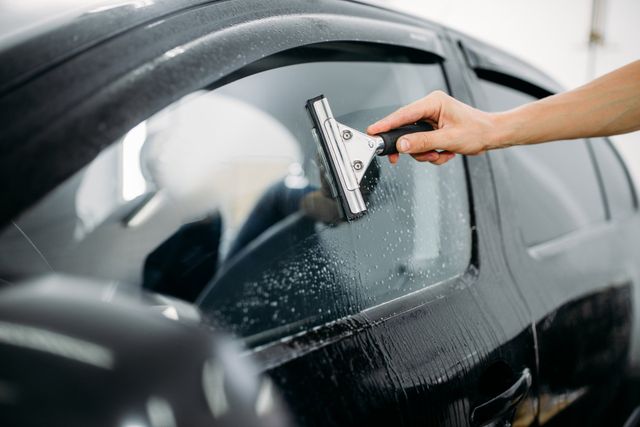Your Comprehensive Guide to DIY Window Tinting: Advice
Taking on a Do it yourself window tinting project presents a chance to boost both the performance and looks of your area. Before beginning on this venture, it is important to navigate the intricacies of local tinting laws and pick a proper film that straightens with your goals.
Understanding Home Window Tinting Laws
Browsing the complex landscape of home window tinting legislations is essential for any kind of DIY fanatic looking for to enhance their automobile's looks and comfort. Each state in the united state has certain policies pertaining to the allowable degrees of color on different home windows, which can dramatically impact your decision-making procedure.
Typically, these legislations determine the maximum allowable Noticeable Light Transmission (VLT) percent, which refers to the quantity of light that can pass through the colored home windows. For example, some states permit just a particular percent of tint on the front windshield, while permitting darker tones on rear windows. Compliance with these policies is essential, as failure to stick can cause fines or the need to remove the color completely.
Additionally, there are often distinctions between guest cars and business automobiles, with different guidelines using to each category. It's a good idea to consult your regional Department of Electric motor Autos or equivalent authority to gather specific details tailored to your location. Understanding these legislations not only ensures lawful compliance but additionally improves security by preserving visibility and preventing possible dangers while driving.
Selecting the Right Color Film
Selecting the ideal tint film is a vital action in the DIY window tinting procedure, as it directly affects both the appearance and functionality of your automobile's home windows. A number of factors need to assist your choice, including the type of movie, its lawful compliance, and your preferred outcomes.
First, consider the various kinds of color films readily available: colored, metalized, ceramic, and crossbreed. Dyed movies supply a basic degree of privacy and warmth decrease however might fade gradually. Metalized movies provide enhanced heat being rejected and toughness but can hinder digital signals. Ceramic films, while more expensive, give superior warmth resistance and UV defense without signal disturbance.
Following, ensure that the film abides by regional guidelines worrying visible light transmission (VLT) portions. Compliance with these legislations is crucial to prevent fines and ensure security.
Vital Devices for Do It Yourself Tinting
Having actually picked the ideal tint film for your windows, the next step includes collecting the essential devices to make certain an effective installment. The key tools you will need include an utility knife or a razor blade, which is crucial for reducing the tint movie to the desired dimension. A squeegee is likewise vital, as it helps remove air bubbles and ravel the film throughout application.

Additionally, think about making basics use of a warm gun or hairdryer, as this can help mold the color film to the shapes of the home window and help with adherence. Handwear covers are recommended to avoid fingerprints on the movie throughout installation. By collecting these crucial devices, you will be well-prepared to tackle your DIY window tinting project properly.
Step-by-Step Application Process
Begin by thoroughly cleansing the window surface to guarantee ideal adhesion of the tint movie. Use a glass cleaner and a lint-free fabric to eliminate any dirt, dirt, or grease. As soon as the window is tidy, determine the tint movie versus the window, permitting for a small overlap on all sides. Cut the movie as necessary with a sharp utility blade for an accurate fit.
Gently spray the window surface area and the glue side of the film. Thoroughly straighten the film with the top of the window, ensuring it is right. Utilize a squeegee to smooth the film, using firm, also stress.
Permit the color to treat for at the very least 24 hours without rolling down the home windows. Follow these steps carefully for optimal outcomes in your Do it yourself home window tinting task.
Upkeep and Treatment Tips

It's advisable to wait at the very least a week after installment before cleansing your home windows to allow the sticky to fully heal. During this preliminary duration, stay clear of rolling down the windows to stop any kind of damage to the color.
Routine upkeep entails checking the edges of the tint for any kind of indicators of gurgling or lifting. If you see any kind of issues, it's finest to resolve them immediately to stay clear of additional deterioration. Additionally, beware with making use of window treatments, such as shades or curtains, as they can produce warm that might jeopardize the color in time.
Verdict
To conclude, embarking on a DIY home window tinting task necessitates careful consideration of local policies, selection of ideal tint movies, and the utilization of necessary tools. A methodical application process ensures optimal outcomes, while regular upkeep adds to the longevity of the color - Moro Auto Spa Window Tinting. By sticking to these standards, individuals can accomplish both visual enhancement and increased personal privacy in their areas, making do it yourself home window tinting a valuable undertaking